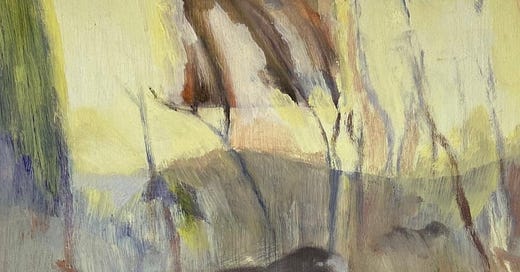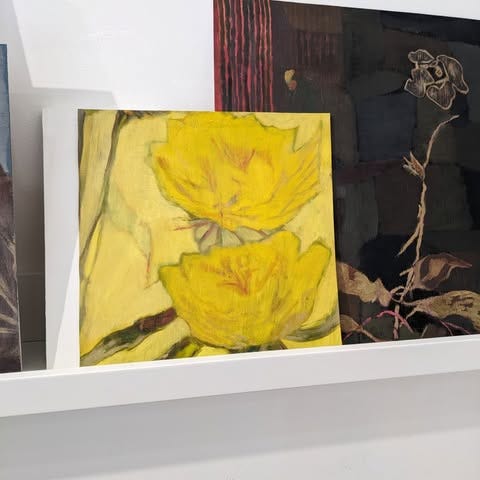Imposing an architecture on the void
Defining productivity, living honestly, resisting external pressures
If you’ve worked in startup marketing like me, thinking about the phrases ‘hustle and grind’ and, ‘work smarter not harder’ will send a shudder through your spine. Years of moving through work at a worryingly unnatural pace, ruthlessly cutting corners on projects that are meant to be creative and being overstretched for time and attention will do that to you.
I still have a toe dipped in the startup marketing world, but I’m highly critical of the culture that’s borne of it. Now when I hear the word ‘productivity’, I see red.
⟡✦
There’s a big part of me that loves being productive — or feeling accomplished, I should say. Waking up early to cook, clean, read, knit, bake — these are all things that feel lovely and low stakes, so even a partially ticked off to-do list feels like a day well spent.
In the latest issue of The Believer, Carrie Brownstein defines productivity as ‘less about getting shit done and more about imposing an architecture on the void’. It is a definition of productivity that feels so apt for the type of slow and mindful life that I want to live. Here, productivity is a reassuring foundation to explore life, rather than a race to achieve as much as you can in as little time as possible.
But there is a another part of me that can’t square the definition of productivity that says that for something to be productive, there must be outcomes. See Merriam-Webster’s first three definitions of ‘productive’:
So there must be a cake made, there must be pages read in a book, there must be progress made with my knitted cardigan. Otherwise, can I really prove that I did anything with my day?
⟡✦
I’ve been in a contract with a gallery for around 6 months now, which means it’s been 6 months since I’ve tied up my art with money. I wasn’t naive when I started this contract; I knew that with the expectation to produce and sell would come the pressure to be more productive. But in truth? I thought I’d be able to (1) find a rhythm with producing new works, and (2) that I’d be overjoyed that I was selling in the first place.
The reality has been quite different.
While I’m beyond grateful that people love my work enough to buy it, I sometimes feel I might have liked a little longer to spend with my paintings, before sending them away to new homes.
I’ve also realised that I don’t just want to ‘handle’ the pressure to be productive. I want to actively resist it. Something about viewing art-making through the lens of productivity feels so disingenuous to me.
So in the end, I told the gallery that I’d been working on lots, but that it’s taking time. I told that it’s frustrating to not be able to resolve paintings quickly — but that I can’t help it. I also told them I did have some finished pieces, but I wasn’t ready to part with them for the time being.
When I told them this, I got the sense that it was more a message to myself than to the gallery — a firm reminder to reorient myself towards what, deep down, I know is most important to me: my actual practice.
Practice, as in: turning up to the studio.
Practice, as in: daydreaming, researching, drawing, painting.
Practice, as in: the process.
I’m not the type of artist that can churn out lots of work constantly, so it feels good to finally give myself permission to go slowly, and to focus on the spirit of art, which is accessed in the act of creating, rather than the outcome.
I’m not making paintings to be prolific, or make money. In the words of Carrie Brownstein, I’m just imposing an architecture on the void. While I’m at it, I might occasionally feel a little joy. Most days I’ll feel the frustration of a difficult time at the studio. But I’ll always, always feel the contentment of doing something ultimately quite insignificant, just for myself.
To end, some prompts for you (which I would love to read your answers to!)
SNAIL’S PACE: What “productive” things do you find yourself doing really fast — perhaps even on autopilot? Write down what you think would happen if you did those things slowly, with a sense of curiosity toward the activity? Then try in real life.
PERMISSION TO FAIL: What new things have you not attempted because you think you won’t be good at it? What if you just did it anyway? Plan a day for yourself where failure is a given.
CLONES: If you had a clone of yourself to help you with any activity, what would you do with them and why? What do you imagine you could achieve together?
VOID: You are starting life completely anew. No job, no responsibilities, no money required for anything you want to do. Your possibilities are endless. Map out how would you fill your 24 hours. The caveat is you have to repeat this schedule everyday for the next 3-6 months.
NEW RULES: Productivity is no longer based on any tangible metrics like how much stuff you get done and how quickly you get it done. It’s not even based on how much joy you felt doing the thing, or if you learned anything from it. What other criteria could you use to measure how well you spent your day? Obscure, nonsensical answers are encouraged.






